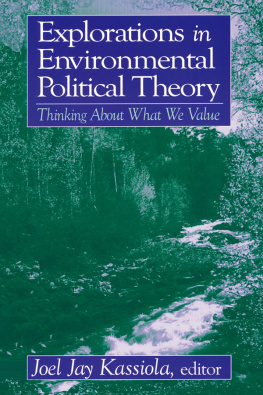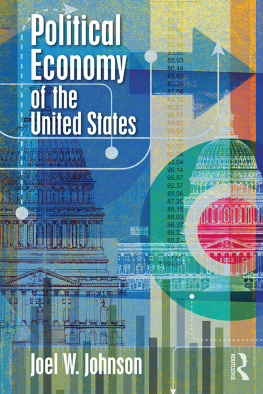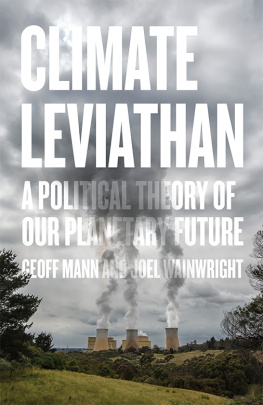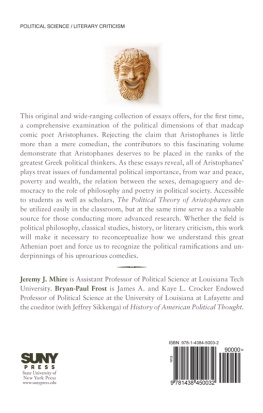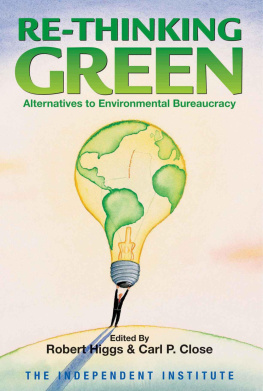First published 2003 by M.E. Sharpe
Published 2015 by Routledge
2 Park Square, Milton Park, Abingdon, Oxon 0X14 4RN
711 Third Avenue, New York, NY 10017, USA
Routledge is an imprint of the Taylor & Francis Group, an informa business
Copyright 2003 Taylor & Francis. All rights reserved
No part of this book may be reprinted or reproduced or utilised in any form or by any electronic, mechanical, or other means, now known or hereafter invented, including photocopying and recording, or in any information storage or retrieval system, without permission in writing from the publishers.
Notices
No responsibility is assumed by the publisher for any injury and/or damage to persons or property as a matter of products liability, negligence or otherwise, or from any use of operation of any methods, products, instructions or ideas contained in the material herein.
Practitioners and researchers must always rely on their own experience and knowledge in evaluating and using any information, methods, compounds, or experiments described herein. In using such information or methods they should be mindful of their own safety and the safety of others, including parties for whom they have a professional responsibility.
Product or corporate names may be trademarks or registered trademarks, and are used only for identification and explanation without intent to infringe.
Library of Congress Cataloging-in-Publication Data
Explorations in environmental political theory : thinking about what we value / edited by Joel J. Kassiola.
p. cm.
Includes bibliographical references and index.
ISBN 0-7656-1052-3 (alk. paper) ISBN 0-7656-1053-1 (pbk: alk. paper)
1. Political ecology. 2. Green movement. 3. EnvironmentalismPolitical aspects. 4. Sustainable developmentPolitical aspects. I. Kassiola, Joel Jay, 1945
| JA75.8.E97 2002 |
| 320.5DC21 | 2002066945 |
ISBN 13:9780765610539 (pbk)
ISBN 13:9780765610522 (hbk)
Joel Jay Kassiola
Environmental concerns [are] political concerns and the best way to understand environmentalism [is] as a complex set of political ideas. Environmentalism was the first new and truly distinctive political ideology since socialism and as important as liberalism, conservatism, and socialism in their time. Moreover environmentalism was different from any of the other ideologies in several important ways.
Robert C. Paehlke
Mission and Approach
The main point of this volume, and the central proposition that is shared and defended by its contributors as expressed in the epigraph and essay by Robert C. Paehlke, is that the fundamental issues raised by the global environmental crisis facing humanity today are essentially political in nature. Therefore, in the view of these authors, environmental issues must involve political values. It is the overall goal of the authors to rationally persuade the reader of the primary importance of political theorythe systematic study of political valuesto:
understand the political character of current environmental problems and their potentially harmful consequences;
comprehend how humanity arrived at the fateful condition where the long-term sustainability of all living species is in question; and, most significantly,
recognize and respond effectively to the reality that the only way we may be able to avoid ecological disaster is by transforming our dominant values, social institutions, and manner of living constitutive of modernity (or industrial civilizationwhat Pirages terms the Third Revolution in Human Affairs).
In brief, the mission of Explorations in Environmental Political Theory is to demonstrate the contribution political theory can make in understanding the environmental crisis, its origins, and a possible resolution. This is done for the purpose of overcoming the crisis by transforming modern industrial civilization into a social order that is ecologically sustainable, socially just, and individually fulfilling to its members. To begin, a statement about the nature of political theory is in order.
Political theory (or political philosophy, or political thought, as it is alternatively called) is the subfield within the discipline of political science that was founded by the thought and works of Plato 2,400 years ago. In contrast to his student, Aristotle, who may be considered the founder of political science with its characteristic (present) emphases upon the (scientific) description, explanation, and prediction of empirically observable phenomena, like revolutions, Plato and his successors in political theory throughout the ages have focused on political values and obligations. Political theorists reflect upon: (1) the historical development of political values and obligations within Western thought and culture; (2) their meaning and applications for both society and individuals; and, perhaps foremost (3) the rational defense of particular political values and obligations. As a result, political theorists prescribe to individuals how they ought to behave, and to societies how they should be organized and how their citizens ought to be treated. Such well-known political concepts and values as justice, equality, freedom, and democracy, form the core of political theoretical discourse. In addition, how these values, once socially understood and agreed to, are to be applied and realized in the concrete, everyday social world is another distinctive component of the field of political theory.
Following the familiar metaphor of the environmental political theory of deep ecology versus shallow ecology (see McLaughlins essay), we may think of political theory as deep politics and environmental political theory as deep environmental politics. This terminology is suggested to draw a contrast to the typical scientifically oriented, political study or policy analysis of an environmental issue or government policy, such as air pollution or the Clean Air Act, although I do not wish to stigmatize such scientific or policy studies with a disparaging sense of shallow. I merely want to point out that such studies do not address the deep issues that include the value-based foundation of the environmental crisis and the resulting need for social transformation, as the contributors to this volume emphasize.
The purpose of this collection of essays, which highlights the convergence of inquiries into the environment and political theory, is to provide examples of the best work done by political theorists on the broad subject of the environment. All of the authors have completed book-length inquiries into the uncharteduntil recentlyintellectual landscape (hence the term explorations) where normative (having to do with values) political analyses, environmental limits, and problems intersect. I believeas this volumes title reflectsthat the works of these authors and their colleagues constitute a new and emerging field of study: environmental political theory, where we need to think deeply about what we value as a society, and as individual citizens. It is my hope that the publication of this volume will enable this still developing field to achieve greater levels of public, policy-maker, scholarly, and student awareness, and stimulate more political theorists and environmental researchers to consider its profound subject matter and goals.

